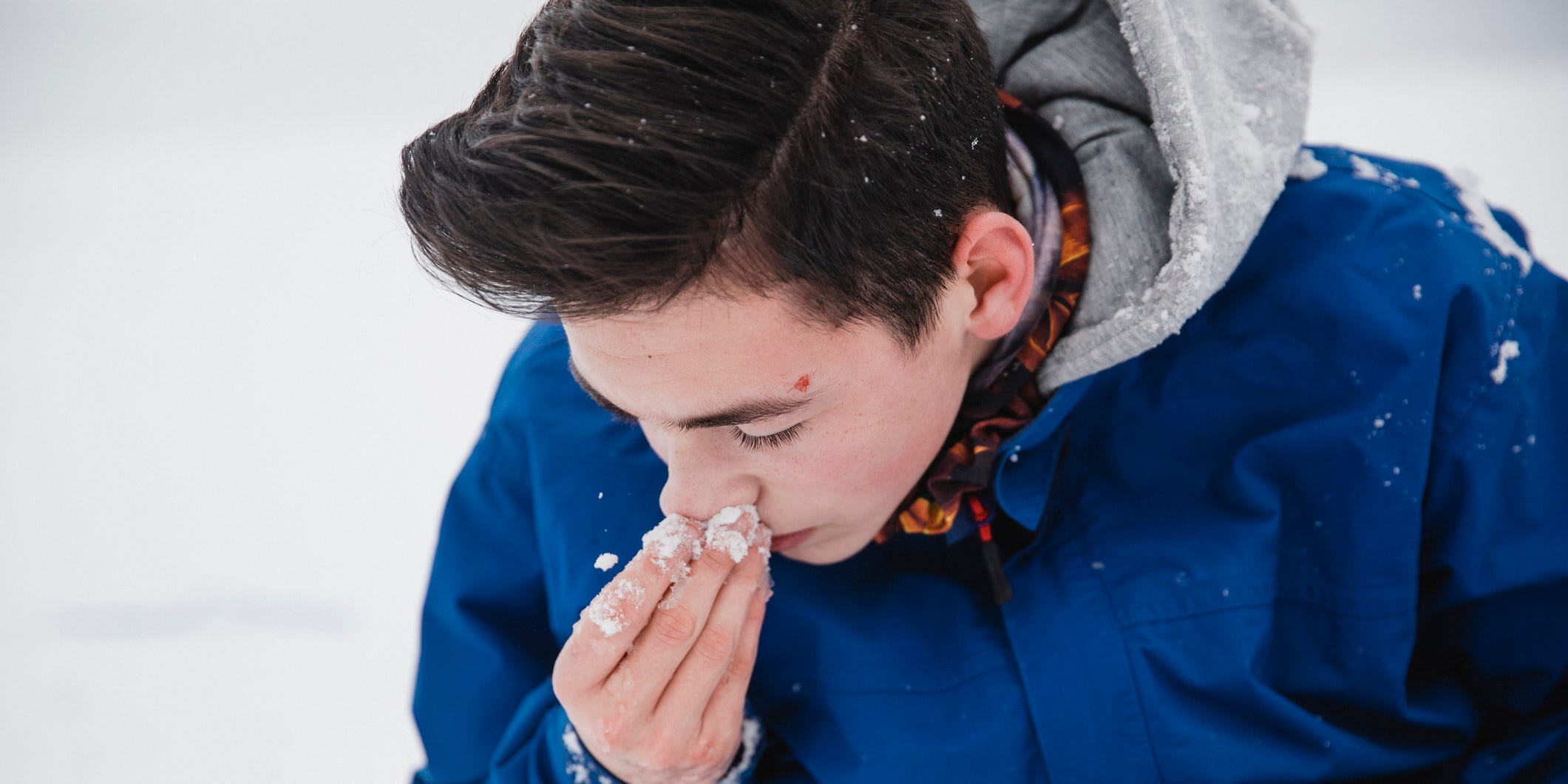
SolStock/ Getty Images
- Nose bleeds are common and are generally not a cause for concern.
- Some can be caused by nasal dryness, a cold, and/or a deviated septum.
- To stop one, pinch your nostrils, don't blow your nose, and don't stick anything in your nose.
- Visit Insider's Health Reference library for more advice.
Nosebleeds occur when blood vessels inside of your nose break open. The causes of this are numerous, from nose-picking to dryness to certain medical conditions.
"They are very common and affect up to one in seven adults in the US," says Anne Getz, MD, a rhinologist at the UCHealth Sinus Center. Nosebleeds aren't necessarily a major health concern, unless they are frequent or severe.
These are some basics about what causes nosebleeds, what to do if you get one, and when to know to get medical attention.
What can nosebleeds be a sign of?
Nosebleeds can come on suddenly for a variety of reasons, says Olivia Kalmanson, MD, an otolaryngology resident at the University of Colorado.
- Nasal dryness. "The most common cause of nosebleeds is nasal dryness. Living in an arid climate, using heated air, and being dehydrated commonly contribute to dryness," says Kalmanson. "High altitude causes a variety of physiologic changes that have the downstream effect of dehydration, which indirectly contributes to nasal dryness," she adds.
- Medications. ". Some medications that cause nasal dryness which lead to nosebleeds, include antihistamines, nasal decongestants, nasal steroid sprays, and intranasal oxygen says Getz.
- Illnesses. A sinus infection or cold can put you at a higher risk for a nosebleed because the lining of the nose gets irritated.
- Certain diseases and conditions. Having high blood pressure or pregnancy can also lead to more nose bleeds, says Getz.
- A deviated septum. This is when the two halves of your nose don't fuse symmetrically in the womb, causing the wall that divides your nose to be crooked. A deviated septum "can alter the normal airflow through the nose and lead to increased nosebleeds," says Kalmanson.
How do you deal with a nosebleed?
If you get a nosebleed, here are some ways you should, and should not, stop it:
- Do not tilt your head back. Many people think they need to tilt their head back during a nosebleed, but, "in reality, this is just a way for you to swallow all the blood from your nose bleed until the bleeding stops on its own," Kalmanson says.
- Pinch your nostrils closed instead. Instead of pinching the bony bridge of your nose, Kalmanson says close your nostrils with your fingers "as if you are going to dunk underwater" for 15 full minutes straight to allow the bleeding to stop. Repeat this for one more cycle if needed.
- Use a nasal spray. "If you have frequent nosebleeds, it is worth keeping a bottle of nasal decongestant in the house," says Kalmanson. The nasal decongestant oxymetazoline constricts blood vessels in the nose. You should consult your doctor first before doing this.
- Do not stick anything inside your nose. Although it may seem counterintuitive, sticking tissues, tampons, or cotton pads inside your nose is not recommended. Kalmanson says it can scratch the inside of your nose and dislodge any clots that have formed.
- Do not blow your nose. "Don't blow your nose until several hours after the bleeding has stopped," Kalmanson says, because the bleeding can restart if a clot is disrupted.
How to prevent a nosebleed
Preventing nosebleeds can be done by hydrating properly, since many are caused by nasal dryness. Saline spray can be used three to four times a day to hydrate the inside of the nose, Kalmanson says. A humidifier can also help.
High blood pressure can also increase the risk of nosebleeds. "If you are prescribed blood pressure medication, be sure to take it as prescribed," says Kalmanson.
Sticking your fingers in your nose is also a no-no, says Kalmanson. "This one seems obvious, but even using a tissue inside the nose can start a nosebleed for some people. If you have dry crusts in your nose, soften them with saline sprays or rinses and then blow your nose to get them out."
How often is too often for a nosebleed?
Nosebleeds are common but can be a cause for concern in some cases.
"Recurring nosebleeds and those that do not stop easily after several minutes applying pressure warrant medical evaluation," says Getz. Some people need medical help to stop frequent nosebleeds.
If you have tried the above methods and your nosebleed is not slowing, you may need to head to the emergency room or your primary care doctor to get medical help to make it stop.
If your nose bleeds persist and interfere with your daily life, you should talk to a doctor, who may refer you to an otolaryngologist, an ear, nose, and throat doctor.
A nosebleed can rarely be caused by a tumor, but this usually comes with other symptoms. "In these unusual cases, patients may have other symptoms like fatigue, unintentional weight loss, headaches, eye pain, double vision, and/or numbness of the face," says Kalmanson. She adds that leukemia and other issues with the function or production of blood components "can be a cause of frequent and/or difficult-to-control bleeding in any site, including from the nose."
Insider's takeaway
Nosebleeds are common in adults, typically due to nasal dryness. Keep your nasal membranes hydrated to prevent nosebleeds, but if one occurs, remember not to tilt your head back and swallow the blood or stick tissues up your nose.
Instead, pinch your nostrils and wait for the bleeding to stop. See a doctor regarding your nosebleeds if they don't stop after using over-the-counter and at-home methods or interfere with your everyday life.